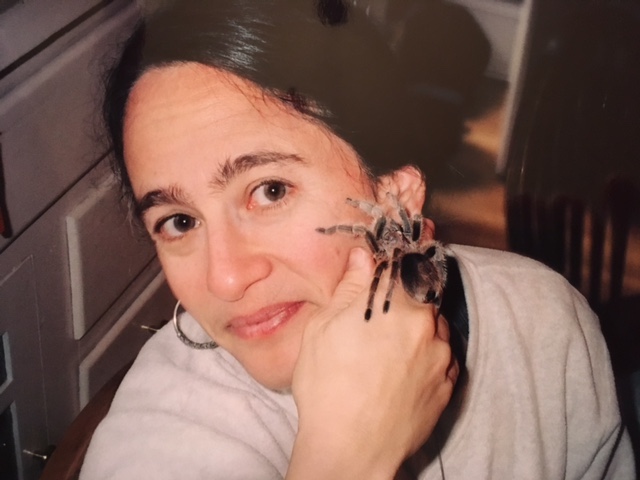Poetry Month Spotlight: Angela Williamson Emmert
Poetry Month Spotlight
Angela Williamson EmmertWhen the Orchard Is Gone
I will grow a forest: weedy
box elders, fast-spreading pine.
I will cast the spores of mushrooms,
seed them throughout, those cool-
season eaters of dirt
and flesh. Perhaps I’ll live
long enough to harvest, but if
I succumb to hunger, leave my body
in the grass. The heart of the world flutters
like a bird in its failings.
To the thing that comes next,
I would contribute.
Faced with the death of trees
I’m forced to believe in death
believe in the way I believe that I once
caught a ten-dollar ride in a van, fitted
with benches made of lumber, traveled
the highway to Darjeeling (beltless),
how when we stopped to let a young
woman puke, I almost collapsed
beneath the crush of white Himalayas,
a white moon peaking over jagged
edges setting the world on tilt. Mountains
crumble down into sand someone might
dig from a hill, like we did as kids,
unearthing pockets of rotting granite
that crumbled like sugar-cookies. I’ve peered
inside the metropolis of a fallen sequoia
and photographed the wild crossings
that once were her guts and whispered
greetings to her babies, and all of this
I have done and never measured death.
But show me a dying oak, my uncle’s oak,
framing his view of a lake, going gray
with wilt and an entire evening of news
without one word of a species
passing, and now I know death’s measure,
know to be afraid of trees dropping in forests
or in yards, hybrid poplars rotting at the base,
branches bleaching, giant ash, the skin
hidden by bark burrowed under by beetles.
Or something simpler: my grandmother
clipped a willow branch in her twenties,
rooted it in her backyard. Grandchildren
strictly forbidden from swinging
in its branches limited themselves to only one go.
She outlived it. They took out the stump
when she moved into town, to a small house,
one without stairs. Nothing to carry us
upwards, to renewal, or some other quiet end.
*This poem previously appeared in Lakeshore Review 22 (Fall 2022).
What To Make of the Bodies
The orchard I planted for my father’s memorial
languishes. Fungus infects
the spongy trunks. They slip bark
in rings, sloughing it off like tokens that have lost
their meaning, like dry skin, like ash. I’d like to dig
him up, my father, turn his time-torn
body loose, let the wind
flake away the graying hairs, the strands of red
that still clung in his beard. I would grind
his bones with the gravel of my driveway to mingle
with the ribs of a redbelly snake and the feathers
of the wren I wrestled from the cat.
She lies beneath the winter-burned boughs
of a pine greening at the tips, feeding
what creatures come by her. My dying
orchard. I dream of your blooming,
of petals felled by rain, caught
in grass, dissolving with the dew.
Lament
No butterflies came to the garden
this year. I could hardly stand
to look at the milkweed,
prolific but empty. My flowers
withered unvisited.
Not a single monarch. No yellow
swallowtails or blues, hardly
even a sulphur or a cabbage
white. All summer the ox-eyed
daisies naturalized, waved
their yellow masses, mixed
with the goldenrod in the perimeters
of our yard, but nothing fluttered
among them. It’s enough
to make me fold this poem
into the shape of a butterfly to launch
like a paper plane over the flower
bank if only to fill
the loneliness. Maybe this is the future:
we’ll decorate our yards with the memories
of flowers, of bees
and dragonflies and all manner
of flying or crawling bugs. A million crafters
employed to shape
them from tin, wings
attached with springs so their flapping might
comfort us, so many motherless
monkeys wrapped around our water
bottles, or chicks huddled
under lamps, a widower lunching with a photo
of his wife, or the insomniac
who plays a recording of leaves
turning, of waves
lapping stone, of birds
breaking through morning. Until we
forget. The air
this summer has been so still
only a poem can float there. It rides
the red hum of the sun’s
descending and crests a hill
out of sight. But listen.
Do you hear how it whistles?
How it answers the sky’s
gloaming blue?
Artist Statement
My orchard got sick, and I’d never felt so betrayed. I spent the summer treating the fungus, repairing rabbit and mower damage, and enriching the soil. We live in a strange time, though, when so much of what we once called “natural” no longer is, and in these poems, my orchard’s struggle with an unnaturally humid summer is not a synecdoche for the struggling world but is the world’s struggle. My feeling of betrayal, though, was projection. It is we who have betrayed. So many small deaths. Even if they go unnoticed, we are fools to think they do not change us. Through my work, I seek language for that change. Now a year has passed. My orchard may never be what it once was, but it persists. As do I.
Angela Williamson Emmert lives in rural Wisconsin with her husband and sons.


BMP Celebrates National Poetry Month
Happy National Poetry Month! For poets and poetry lovers—and perhaps for those who love poets—this is a special time. At Brain Mill Press, we like to celebrate all month long by sharing featured poets. This year, we’re reprising award-winning poets from prior years’ contest, introducing new poets we admire, and inviting submissions to a joint chapbook contest with the Wisconsin Fellowship of Poets to celebrate the work of a Wisconsin poet with publication.









 Miles Morales Suspended
Miles Morales Suspended Cool. Awkward. Black.
Cool. Awkward. Black.
 The Nightmare-Verse Trilogy
The Nightmare-Verse Trilogy We Are All So Good at Smiling
We Are All So Good at Smiling










Recent Comments